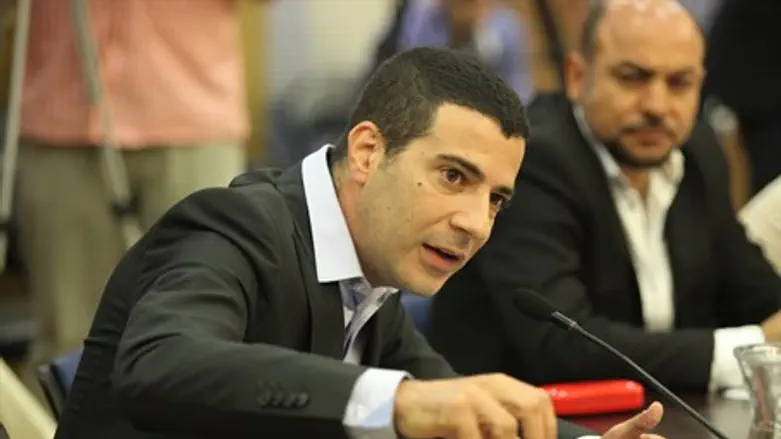
An online campaign calling for the death penalty to be applied to terrorists was launched on Wednesday by MK Sharon Gal (Yisrael Beytenu), whose terrorist death penalty bill is facing a critical Knesset discussion on Sunday.
The new bill would alter the law, requiring that those found guilty of murder for terrorist reasons be executed. Gal lost no time in fulfilling his party's campaign promise on the matter and submitting the bill as soon as the 20th Knesset was sworn in.
On his Facebook page Wednesday, Gal launched a campaign calling for concerned Israelis to post pictures of themselves with a sign reading "I'm also in favor of the death penalty for terrorists."
He called for the pictures to be shared widely, so as to exert pressure on the governmental ministers to respond to the mandate of the public calling for more stringent methods of deterrence against terrorism.
"We promised and we are earnest to deliver," stated Gal. "We must change the reality and topple terrorism. The death penalty law will strengthen Israeli deterrence - it is moral and ethical to legislate it for the preservation of the life of our citizens."
He stated the bill has "wide support among the people - it is clear to all that this is a law that must pass."
While Israel already has a death penalty on the law books, it has only been implemented once, in the case of Nazi leader Adolf Eichmann, who was put to death back in 1962.
Gal's bill includes a clause specifying that those murdering innocent Israeli civilians through terrorist activities in Judea and Samaria - which remains under martial law given that Israel has yet to annex the region following its liberation in the 1967 Six Day War - will also be liable to the death penalty.
Majority of military judges will suffice
Currently only a unanimous vote by judges in Judea and Samaria military courts can lead to a death penalty, a result that has yet to be recorded. Instead the new law would require only a majority to rule the death penalty, and likewise it will prevent the regional IDF commander from being able to lighten the sentence.
In a previous effort to address the situation whereby Arab terrorists sit in jail in privileged conditions before being released in terror swaps, such as the 2011 Gilad Shalit deal that saw 1,027 terrorists go free, the Jewish Home initiated a "life without parole" law that was passed last November, during the term of the last coalition.
However, Meir Indor, head of the Almagor terror victims organization, revealed to Arutz Sheva last year that the Jewish Home law is "practically ineffective."
One of the key flaws, he pointed out, is that it doesn't address terrorists sentenced in military courts in Judea and Samaria, where the majority of attacks and concurrent trials occur. Another shortcoming, he noted, was that the law didn't apply retroactively to terrorists who were already sentenced prior to its passage, and that it leaves it up to the judge's discretion whether or not to sentence a terrorist without chance of parole.
